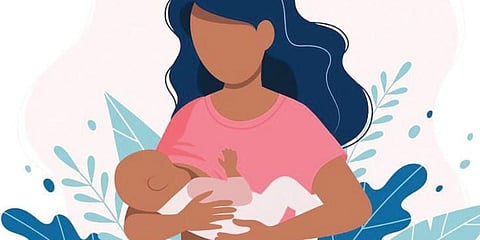

NEW DELHI: Most Indian states have been able to achieve 90 per cent in initiating newborn breastfed within one hour of birth, but 11 states and union territories, including Telangana, are far behind in meeting this goal, according to government data.
Among the culprit states, Delhi tops the list, where only 67 per cent of the newborn babies were breastfed during the first hour of delivery, followed by Puducherry, the second worst performer with a 69 per cent score in 2021-22, said the Union Health Ministry report of the Health Management Information System (HMIS).
The two are followed by Andaman and Nicobar Islands (72.53 percent), Goa (73.64 percent), Telangana (80.75 percent), Arunachal Pradesh (81.28 percent), Punjab (81.67 percent), Sikkim (83.41 percent), Manipur (83.62 percent), West Bengal (84.80 percent) and Chandigarh (84.95 percent).
Apart from these 11 states and union territories, five states and union territories, which include Bihar, Haryana, Ladakh, Mizoram and Dadra and Nagar Haveli and Daman and Diu, showed a decline in the percentage of breast-feeding in 2021-22 as compared to 2020-21.
These five states and UTs recorded less than 85 per cent in ensuring that newborns receive the colostrum, ‘the first breastmilk,’ which contains antibodies that protect the infant against diseases. Breastfeeding within the first hour of life prevents newborn death due to sepsis, pneumonia, diarrhoea and hypothermia.
The report said that in 2020-21 and 2021-22, the percentage of newborns breastfed within one hour is more than 90 per cent at all Indian levels, including most of the states and union territories.
It said whether delivery occurs in an institution or at home initiates breastfeeding in the first hour of life, where the newborn is significantly more likely to survive.
“The practice of early initiation can decrease newborn mortality and morbidity, which should be an integral part of the sale delivery procedure. Children who are exclusively breastfed are less likely to die from life-threatening diseases,” the report said.
The World Health Organisation (WHO) and UNICEF have recommended that children initiate breastfeeding within the first hour of birth and be exclusively breastfed for the first six months of life – meaning no other foods or liquids are provided, including water.
Dr Arun Gupta, the central coordinator of the Breastfeeding Promotion Network of India (BPNI), a 31-year-old organisation, working in the area of promoting exclusive breastfeeding in the country, said the states not being able to initiate breastfeeding within one hour is a “shame and reflects that the health system is unsupportive or lacks priority to support women while they come with huge confidence in the hospitals.”
“Looks like it’s not a priority. Over the last five years, there has been a stagnancy in the national rates of early breastfeeding within an hour of birth - that probably demonstrates a lack of a concrete plan of action to increase breastfeeding rates, both national and state level,” he told this newspaper.
He said one of the reasons for failing to initiate newborns to breastfeed within one hour is the increasing number of Caesarean sections in the country, which is seeing an alarming rise in both public and private health facilities. "In C-section, a perception has been created by doctors and nurses that the mother won't be able to breastfeed the newborn because of the surgery. But if health workers are skilled enough, then they can support the mother," he said.
Gupta, a paediatrician, who has been relentlessly working towards optimal nutrition for women and children, said that the health system can initiate newborns within one hour if they are well trained and skilled to help all women whether they give birth by vagina delivery or C-section.
Some steps that can be improved are if the government or private hospitals manage and monitor data on early breastfeeding and the use of infant formula immediately after birth.
Also, a formal session on breastfeeding discussion and knowledge transfer during pregnancy is necessary.
The government could also consider accreditation as breastfeeding-friendly hospitals based on World Health Organisation's (WHOs) ‘Ten Steps to Successful Breastfeeding’ to improve breastfeeding practices in hospitals with maternity services. One of the steps recommended is immediate and uninterrupted skin-to-skin contact and support for mothers to initiate breastfeeding as soon as possible after birth.
“All private maternity hospitals should be encouraged to implement such a programme,” he said, adding that BPNI, which has been mandated by the government to monitor a law related to the marketing of infant milk substitutes, is currently trying to implement these steps in private hospitals.
According to WHO, only about 44 per cent of infants aged 0-6 months worldwide were exclusively breastfed over the period of 2015-2020.
Over 820,000 children's lives could be saved every year among children under 5 years if all children 0-23 months were optimally breastfed, it said.